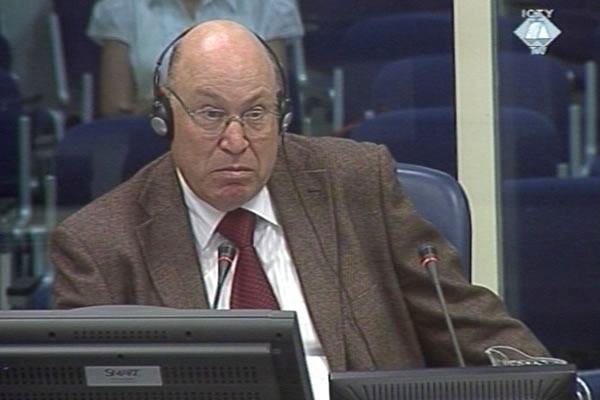Home
FEARS OF ‘ETHNIC HOSTAGES’ IN SARAJEVO
In the cross-examination of General Abdel Razek, Radovan Karadzic argued that Serbs in Sarajevo were ‘ethnic hostages’ of the Bosnian authorities. In the re-examination, the prosecutor asked the witness what were alleged ‘ethnic hostages’ in fact afraid of. ‘Continuous shelling, snipers and shortages…’, the witness replied. The next prosecution witness is Ekrem Suljevic from Sarajevo
 Husein Ali Abdel-Razek, witness at Radovan Karadzic's trial
Husein Ali Abdel-Razek, witness at Radovan Karadzic's trial In the final part of his cross-examination of Egyptian general Abdel Razek, Radovan Karadzic tried to show that what he and other Serb leaders meant when they told the UN representatives that ‘Serbs can no longer live together with Muslims’ was that they ‘don’t want to live under Muslims’. According to Karadzic, Muslims favored a centralized state in which they would dominate.
When asked if he agreed that the Serb leaders in fact ‘were not specific which added to the confusion’, the former commander of UNPROFOR Sector Sarajevo reminded Karadzic of their informal meeting on 7 January 1993 in Pale. The witness asked Karadzic ‘what is the most important thing for the Serb side’. Karadzic clearly replied ‘that Serbs can no longer live together with Muslims’.
‘I keep a diary and I wrote that down’, the Egyptian general said, adding that at the time he had suggested to Karadzic then to reconsider his opinions in light of ‘lessons from history’ proving that people could live together even after bloodshed. The defense showed interest in the diary of the Egyptian general who said he was willing to share it with the parties.
Karadzic put it to the witness that the Bosnian authorities in Sarajevo held Serbs as ‘ethnic hostages’. By ‘limiting the freedom of movement for civilians they attempted to extend the siege mentality’ in the eyes of the international public, Karadzic said, adding that the Serb side asked the UNPROFOR representatives on 6 December 1992 to allow about 100,000 Serb civilians to leave Sarajevo.
General Abdel Razek said that UNPROFOR didn’t have the mandate to act as a mediator in the effort to relocate the civilians ‘across the ethnic borders’. ‘The United Nations guarantee freedom of movement, but not in a state of war,’ the witness explained, noting that any relocation of the people would ‘threaten the population, undermine the credibility of the UN and at the same time increase tensions and hostilities in the crisis zones’.
When Karadzic questioned him, Abdel Razek said that there were Serb civilians in Sarajevo who came in and asked for UN protection. In a brief re-examination, the prosecutor asked what they were afraid of. ‘Constant shelling of the city, snipers, shortages…’, the witness explained. ‘It was not a problem for the people to live together, what they wanted the UN to do was to end the hostilities’, the witness added.
When the judges asked who in Sarajevo wanted the international community to intervene – the SDA or the civilians – the witness said that the citizens of Sarajevo were desperate, that the peace-keepers themselves felt like victims and were inefficient, and that is why it was necessary for the international community to find a solution, the witness concluded.
After General Abdel Razek completed his evidence, the prosecution called Ekrem Suljevic. During the war, Suljevic was a member of the Counter-Terrorist Department in the BH MUP and investigated serious shelling incidents with civilian casualties. In the first part of the examination the prosecution tendered the witness’s written statement into evidence. The statement given in February 2010 is based on Suljevic’s previous evidence in the cases against General Dragomir Milosevic and General Momcilo Perisic. Suljevic continues his evidence tomorrow.
